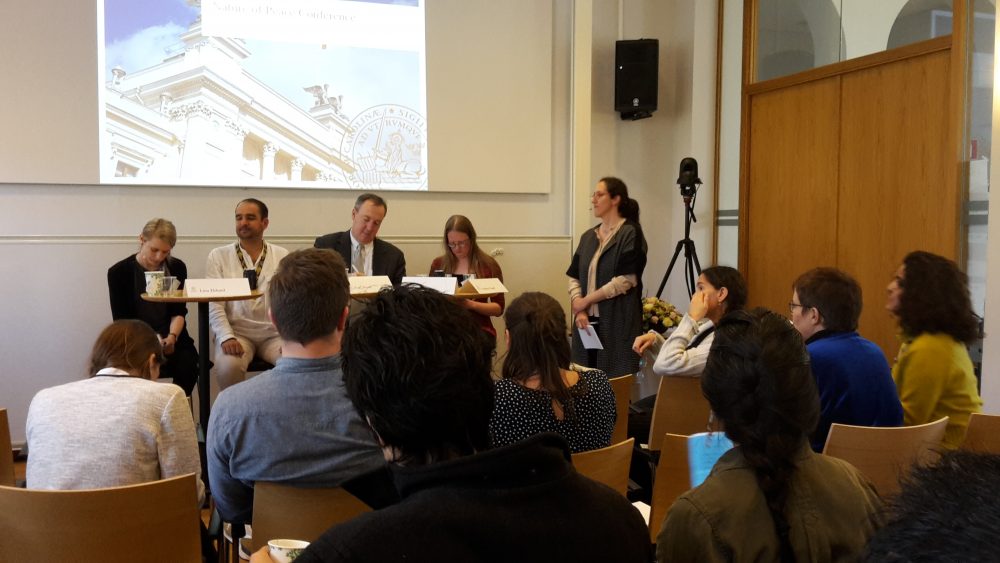What are the links between the natural environment and the peace efforts in societies once impacted by war? In which ways does natural resource exploitation hinder or promote fair post-war recoveries? How our own views on nature limit the understandings of peacebuilding processes? These and other challenging questions built an inspiring academic exchange during The Nature of Peace Conference on April 26th and 27th 2018 at Lund University.
The two-day conference, organized by the interdisciplinary research group The Nature of Peace, brought together around 35 researchers interested in understanding the interlinks between the natural environment the peacebuilding agenda in the aftermath of armed conflicts. Participants of nearly 12 countries shared ideas in 20 presentations divided into six seminars and three interactive sessions. The event took place at the Pufendorf Institute of Advanced Studies and the Lund University Centre for Sustainability Science in Lund, Sweden.
The conference kicked off with an introductory presentation by Carl Bruch, president of the Environmental Peacebuilding Association– also launched at the event- and researcher of the Environmental Law Institute (US). Bruch set the discussion by explaining how the use of resources vary across the lifecycle of conflicts and the implications for maintaining peace. This initial explanation served as a roadmap for the following sessions around the themes of natural resources exploitation, environmental legislation and nature governance, biodiversity conservation and local perspectives.
Check the introduction to the conference:
Discussing diverse cases
In the seminars, the current crisis of Colombia’s environmental impacts in the post-conflict phase, the challenges for conservation and economic development, and some reflections on the role of development and neoliberalism in peacebuilding were recurring themes. These issues were based on empirical and desk-research of cases in Colombia, Northern Ireland, East Africa, and the Middle East.
For instance, Sean Brennan, a researcher from Queen’s University of Belfast, used the example of Northern Ireland to explain the ‘double transition’ -towards peace and neoliberalism- with the export-oriented economic approach in natural resources governance. He stressed how this intervention did not consider social inclusion and reconciliation.
On the side of conservation, Elaine Hsiao, a Global Challenges Fellow at the Sheffield Institute for International Development (SIID), highlighted the need of explicitly including peace and conflict resolution dimensions in Transboundary Conservation Area Agreements, such as Parks for Peace, for the cases of the Greater Virunga Landscape between the Democratic Republic of Congo, Rwanda and Uganda; and Kidepo Landscape, between South Sudan and Uganda.
Rethinking views on nature
In the closing plenary, the discussion allowed the participants to step outside their professional role by discussing personal meanings about nature. The exercise sought to challenge the strong view on nature, as a resource for exploitation, found it in the literature of the field of environmental peacebuilding.
“When we think on a personal level about nature, we don’t talk about natural resources; but in our research work we do. So, what would we gain by using other concepts? What would happen if instead of natural resources we use, for instance, the concept of ecologies?”, inquired the researcher Maria Andrea Nardi, affiliated to the Raoul Wallenberg Institute and member of The Nature of Peace project.
With this final note, the discussion revolved around questions of how the perception of researchers from the Global North about natural resources can influence their research in post-conflict societies, studied in the Global South.
What would happen if instead of natural resources we use, for instance, the concept of ecologies?”
Maria Andrea Nardi, affiliated to the Raoul Wallenberg Institute and member of The Nature of Peace project
The Nature of Peace Conference at Lund University enriched our analysis for the literature review we did in 2018 about definitions of peace and nature present in the current academic endeavors. Especially, the event offered an open and interactive platform for sharing ideas and concepts of current research on the links between the natural environment and the processes of securing a stable and lasting peace in many regions around the world.
In the video, check the closing plenary of the event:

